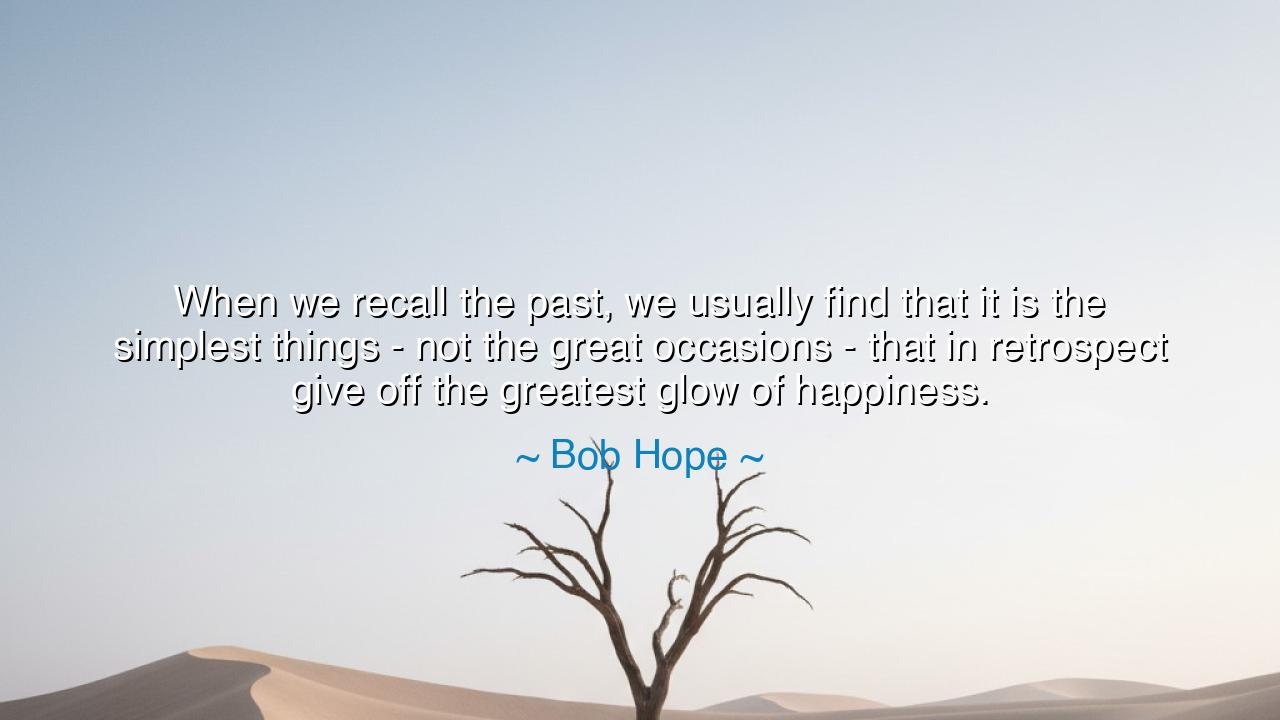
When we recall the past, we usually find that it is the simplest
When we recall the past, we usually find that it is the simplest things - not the great occasions - that in retrospect give off the greatest glow of happiness.






When Bob Hope, the great humorist and beloved entertainer of the twentieth century, said, “When we recall the past, we usually find that it is the simplest things — not the great occasions — that in retrospect give off the greatest glow of happiness,” he gave voice to one of life’s quietest yet most profound truths. Beneath the laughter that defined his art, Hope understood something sacred: that happiness does not dwell in grandeur, nor in fame, nor even in moments of triumph, but in the gentle and unnoticed rhythms of everyday life. The simplest things — a shared meal, a kind word, the laughter of a friend, the warmth of the sun — are the true treasures of memory. They do not dazzle when they happen, but in time, they are the lights that keep the heart warm when all else has faded.
To understand his words, one must remember the life he lived. Bob Hope was a man who stood before thousands, who made kings and soldiers, presidents and paupers laugh. He traveled the world, performing for weary soldiers on foreign soil, bringing smiles to faces shadowed by war. He witnessed both the glamour of Hollywood and the grimness of battlefields. He knew victory and applause — yet when he looked back, it was not the great stages or the grand banquets that he spoke of with tenderness. It was the small, human moments — the soldiers’ laughter amid danger, the handshake of a stranger, the quiet gratitude of a smile. For Hope, happiness was never found in the applause of the crowd, but in the warmth of connection.
This truth echoes through the teachings of the ancients. Epicurus, the philosopher of simple joys, taught that happiness lies not in indulgence or excess, but in friendship, contentment, and the absence of unnecessary desire. To him, a loaf of bread shared among friends was richer than a banquet in a palace. Marcus Aurelius, the philosopher-king, wrote that life’s beauty lies in the ordinary — “the morning light, the laughter of children, the movement of the stars.” Even the Buddha, who renounced his royal life, found enlightenment not in gold or glory, but in the stillness of the moment. Across centuries and civilizations, the wise have always known what Hope discovered through experience: that it is the humble things that endure in memory, glowing softly when time has stripped away all illusion.
Consider the story of Mother Teresa. She devoted her life to serving the poorest of the poor, and though she received countless honors and global recognition, she once said, “It is not the magnitude of our actions but the amount of love that is put into them that matters.” The small acts — the touch of a hand, the tending of a wound, the smile given to one forgotten by the world — these were her true jewels. In her old age, she did not remember the awards or ceremonies; she remembered faces, the feeling of love exchanged in silence. Like Bob Hope, she understood that great happiness comes not from great moments, but from great love expressed in small ones.
The origin of Hope’s insight lies in his humanity — in his ability to see joy in the midst of chaos. During World War II, he performed for soldiers in muddy trenches, under the constant shadow of death. There were no chandeliers, no grand pianos, only makeshift stages and the hum of courage in the air. Yet afterward, he would often say that those moments, when laughter rose like sunlight over fear, were among the happiest of his life. What was this but the triumph of the simple over the spectacular? It was proof that joy does not depend on luxury, but on meaning — that even in hardship, when hearts connect, the soul remembers the glow.
There is a quiet majesty in this truth. The great occasions of our lives — weddings, promotions, celebrations — are like fireworks: brilliant, but brief. The simple things, however, are like stars: steady, familiar, and enduring. They are the small mercies of daily life — a conversation at dawn, the laughter of one’s children, the scent of rain, the memory of a gentle voice. We do not realize their value while we live them, but when time has carried us far from them, they shine more brightly in our hearts than all the splendor we once chased.
So, my listener, take this wisdom to heart: cherish the small things, for they are the true pillars of happiness. Do not wait for the grand moment to feel alive; life is made of the quiet, the ordinary, the present. Each day, pause to notice the light in a loved one’s eyes, the music in laughter, the peace in a simple breath. Keep a heart of gratitude, for it transforms the smallest detail into a source of joy.
And when, in the twilight of years, you look back upon your days, you will find, as Bob Hope did, that the glow of happiness will not come from your greatest achievements, but from your simplest moments — the ones filled with love, laughter, and life’s unassuming grace. For it is not greatness that endures, but goodness, not celebration that comforts, but connection. And these, in the end, are the treasures time cannot take away.






AAdministratorAdministrator
Welcome, honored guests. Please leave a comment, we will respond soon